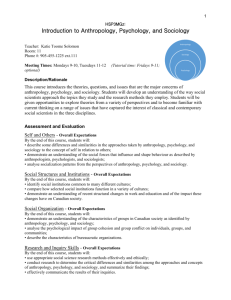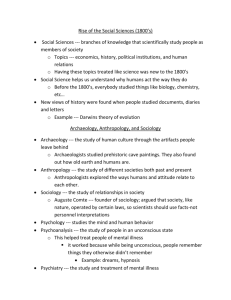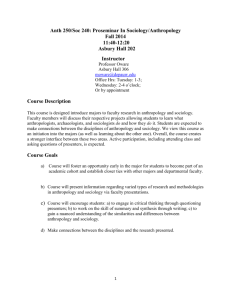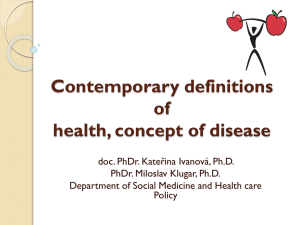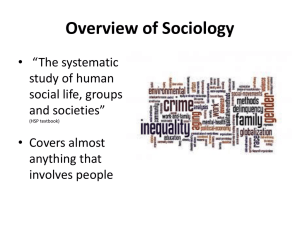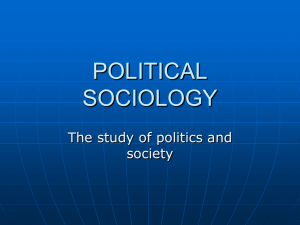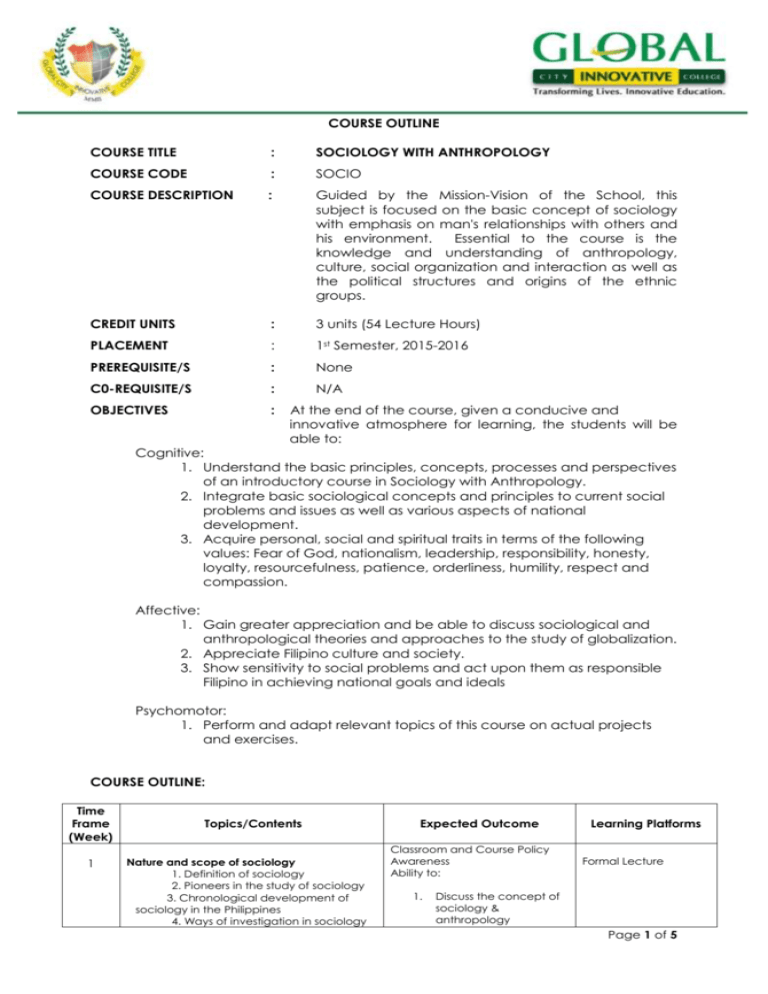
COURSE OUTLINE
COURSE TITLE
:
SOCIOLOGY WITH ANTHROPOLOGY
COURSE CODE
:
SOCIO
COURSE DESCRIPTION
:
Guided by the Mission-Vision of the School, this
subject is focused on the basic concept of sociology
with emphasis on man's relationships with others and
his environment.
Essential to the course is the
knowledge and understanding of anthropology,
culture, social organization and interaction as well as
the political structures and origins of the ethnic
groups.
CREDIT UNITS
:
3 units (54 Lecture Hours)
PLACEMENT
:
1st Semester, 2015-2016
PREREQUISITE/S
:
None
C0-REQUISITE/S
:
N/A
OBJECTIVES
:
At the end of the course, given a conducive and
innovative atmosphere for learning, the students will be
able to:
Cognitive:
1. Understand the basic principles, concepts, processes and perspectives
of an introductory course in Sociology with Anthropology.
2. Integrate basic sociological concepts and principles to current social
problems and issues as well as various aspects of national
development.
3. Acquire personal, social and spiritual traits in terms of the following
values: Fear of God, nationalism, leadership, responsibility, honesty,
loyalty, resourcefulness, patience, orderliness, humility, respect and
compassion.
Affective:
1. Gain greater appreciation and be able to discuss sociological and
anthropological theories and approaches to the study of globalization.
2. Appreciate Filipino culture and society.
3. Show sensitivity to social problems and act upon them as responsible
Filipino in achieving national goals and ideals
Psychomotor:
1. Perform and adapt relevant topics of this course on actual projects
and exercises.
COURSE OUTLINE:
Time
Frame
(Week)
1
Topics/Contents
Nature and scope of sociology
1. Definition of sociology
2. Pioneers in the study of sociology
3. Chronological development of
sociology in the Philippines
4. Ways of investigation in sociology
Expected Outcome
Classroom and Course Policy
Awareness
Ability to:
1.
Learning Platforms
Formal Lecture
Discuss the concept of
sociology &
anthropology
Page 1 of 5
5. Sociology and other sciences
2
Nature and scope of anthropology
1. Definition of Anthropology
2. Theories of evolution
3. Methods of investigation in
anthropology
4. Emergence of Homo
5. Human variations and genetic
evolution
2.
3.
4.
Explain the significance
of sociology to one’s life
Explain the contribution
of early sociologists and
anthropologists to the
society
Describe the distinctions
on the different theories
of evolution
Ability to:
3
Concept of culture
1. Definition of culture
2. Different mindsets on culture
study
3. Cultural relativism
4. Cultural patterns
5. Culture change and
adaptation
6. Colonialism
7. Cultural Transformation:
Intermarriage & Globalization
1.
2.
3.
4.
Discuss the concept of
culture and its influence
in the movement of the
society
Identify different cultural
patterns from the major
parts of the world
Explain the concept of
colonialism and discuss
its immediate effects
Understand the effects
of intermarriage to
one’s original culture
Formal Lecture/
Student Facilitated
Classes
Ability to:
4
Cultural environment and the Individual
1. Sociology and anthropology of
childhood
2. Universality of psychological
development
3. Cross-cultural variation in childrearing
4. Psychological explanations of
cultural variations
5
Filipino Culture
1. Social Belongingness
2. Qualities of Filipino Culture
3. Filipino Family System
Formal Lecture
1.
Explain the apparent
interrelatedness of
sociology and
anthropology to the
varying cultural
viewpoint of the
developing individual
Ability to:
6
Formal Lecture
1.
2.
Describe the qualities of
Filipino Culture
Discuss the Filipino
Family System
PRELIMINARY EXAMINATION
Ability to:
7
Values and Man as a Social Being
1. Definition of values
2. Qualities of modern day values
3. The Filipino values
4. Definition of social
belongingness
5. Analysis of reality social
construction
Formal Lecture
1.
Discuss the concept of
values and explain the
corresponding qualities
associated with it
Ability to:
8
Social relationships and interest groups
1. Character differences
2. Different interest groups
3. Voluntary and non-voluntary
groups
4. Gender concepts and relative
contributions to work
5. Socio-political leadership
1. Explain notions found in
2.
3.
character differences
and the drive of an
individual to be with
variant groups
Discuss gender
concepts and relative
contributions to work
Explain the influence of
socio-political
Formal Lecture/
Student Facilitated
Classes
Page 2 of 5
leadership in a group
Ability to:
9-10
Global economic system
1. Worldwide trend of economy
2. Distribution of goods and
services
3. Alteration of resources and
natural assets
4.
Economic
viewpoint
in
technology
Political life
1. Different types of political
organization
2. Politics: A call to servantleadership
3. Expansion of states/ societies
4. Variation in political process
5. Peace talks and settlement of
conflict
1.
2.
3.
4.
5.
Describe the basic
framework of
economics
Identify the different
types of political
organization
Discuss the rationale of
politics in the expansion
of state
Explain the formation of
politics in sustaining the
identity of the state
Identify necessary steps
to settle conflicts
Ability to:
11
Religion
1. Universality of Religion
2. World religions
3. Religions in the Philippines
4. Variations in religious beliefs
and practices
Formal Lecture/
Student Facilitated
Classes
Student Facilitated
Classes
1. Explain the purpose of
Religion and its
functions in one’s
perception to the
notions of good and evil
Education: Communication & Language
12
MIDTERM EXAMINATION
Ability to:
13-14
Current trends in communication and
language
1. Origins of language
2. Effective communication
3. Writing and literary
4. Process of linguistic deviation
5. Relationships between
language and the social
being
6. Upgraded means of
communication
1.
2.
3.
4.
Discuss the origins of
language
Discuss effective
communication
Explain the process of
linguistic deviation
Explain the relationships
between language and
the social being
Ability to:
15
Applied, Practice and the Science of
Sociology and Anthropology
1. Ethics of applied Sociology
and Anthropology
2. Evaluation on the effects of
practice and change in
sociology and anthropology
3. Challenges
in
instituting
change
in
practice
of
sociology and anthropology
4. Management
of
socio
anthropological resources
5. Understanding the influence
of political and economic
trend to the discipline of socio
anthropology
1.
2.
Formal Lecture
Formal Lecture
Discuss the ethics of
applied Sociology and
Anthropology
Understand the
influence of political
and economic trend to
the discipline of socioanthropology
Ability to:
Formal Lecture / E-
Page 3 of 5
16
Learning
Social stratification
1. Emergence of stratification
2. Different degrees of social
inequality
3. Class societies
4. Ethnicity and inequality
5. Unity in diversity among
cultures
1.
2.
3.
Realize and resolve the
cause of social
stratification
Synthesize the issue of
unity in diversity among
cultures
Resolve global and
national concerns on
nature and society
Socio Anthropology and Globalization
1. Natural disasters and famine
2. Inadequate housing and
domestic violence
3. Crime, War and Terrorism
4. Political agenda
5. Making of a better world
Ability to:
17
Kinship System
Social Relationship and Interest Groups
Marriage and Family / Family Planning
1.
2.
3.
18
Appreciate and
understand the value of
the kinship system
Understand the purpose
and importance of
Family Planning
Realize the purpose of
marriage and
establishing a Family
Formal Lecture/
Student Facilitated
Classes
FINAL EXAMINATION
REFERENCES:
Ember, C.R., Ember, M., Peregrine P.N., 12th ed. Phl printing, Pearson, Prentice Hall, 2007.
Garcia, Manuel. et. al. Development: Its Sociological Dimension . Manila : National
Bookstore Inc. 1993.
Hunt, Chester, et. al. Sociology in the Philippine Setting: A Modular Approach. Quezon
City: Phoenix Publishing House, Inc. 1996.
Marsh, Ian. Sociology: making sense of society. Harlow, England: Prentice-Hall. 2000
Panopio, Isabel S. et. al. General Sociology:
Focus on the Philippines. Quezon City : Ken Inc. 1994.
COURSE WEBSITE
: http://gcicsocsci2.wordpress.com
ACADEMIC PROFESSOR:
ERWIN B. BALOALOA
GRADING SYSTEM:
DESCRIPTION
Class Standing
Output/Project
Recitation
Tests
PERCENTAGE (%)
60
40%
20%
20%
Page 4 of 5
Assignment
Major Exam
20%
40
Total
100
Final Grade:
Prelim
30%
Midterm
30%
Final Term
40%
100%
Page 5 of 5




